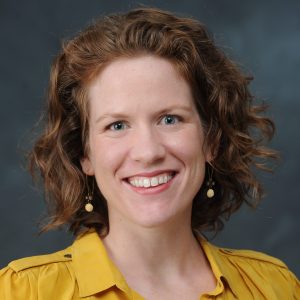 April Holm, associate professor of history at the University of Mississippi and the author of A Kingdom Divided: Evangelicals, Loyalty, and Sectionalism in the Civil War Era, is in the Washington Post. Click here to read the article!
April Holm, associate professor of history at the University of Mississippi and the author of A Kingdom Divided: Evangelicals, Loyalty, and Sectionalism in the Civil War Era, is in the Washington Post. Click here to read the article!
 April Holm, associate professor of history at the University of Mississippi and the author of A Kingdom Divided: Evangelicals, Loyalty, and Sectionalism in the Civil War Era, is in the Washington Post. Click here to read the article!
April Holm, associate professor of history at the University of Mississippi and the author of A Kingdom Divided: Evangelicals, Loyalty, and Sectionalism in the Civil War Era, is in the Washington Post. Click here to read the article!
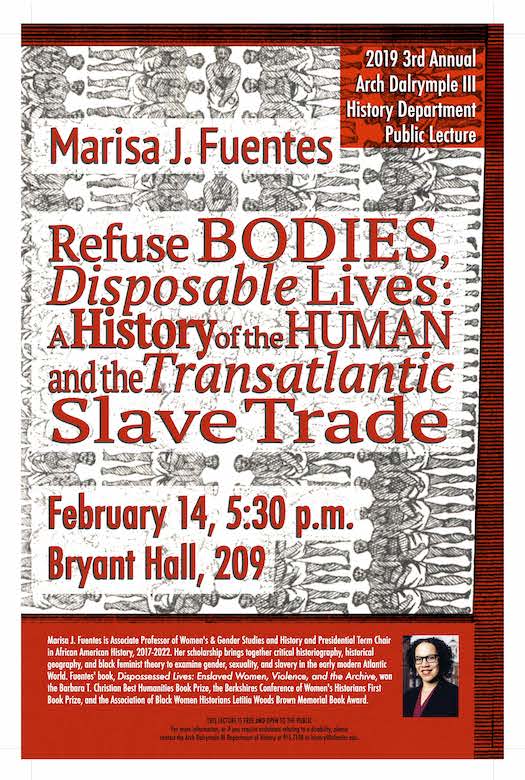 Dr. Marisa Fuentes delivered the third annual Dalrymple lecture, “Refuse Bodies, Disposable Lives: A History of the Human and the Transatlantic Slave Trade” on February 14, 2019 at 5:30 pm in Bryant Hall 209.
Dr. Marisa Fuentes delivered the third annual Dalrymple lecture, “Refuse Bodies, Disposable Lives: A History of the Human and the Transatlantic Slave Trade” on February 14, 2019 at 5:30 pm in Bryant Hall 209.
Fuentes is Associate Professor of Women’s & Gender Studies and History and Presidential Term Chair in African American History, 2017-2022 at Rutgers University. Her scholarship brings together critical historiography, historical geography, and black feminist theory to examine gender, sexuality, and slavery in the early modern Atlantic World. Fuentes’ book, Dispossessed Lives: Enslaved Women, Violence, and the Archive, won the Barbara T. Christian Best Humanities Book Prize and the Berkshires Conference of Women’s Historians First Book Prize, and the Association of Black Women Historians Letitia Woods Brown Memorial Book Award.
 Dr. Shennette Garrett-Scott, Associate professor of History and African American Studies at the University of Mississippi talks on Black Women in Banks in a brown bag lunch talk at noon in Tupelo Room, Barnard Observatory on Wednesday, January 30, 2019.
Dr. Shennette Garrett-Scott, Associate professor of History and African American Studies at the University of Mississippi talks on Black Women in Banks in a brown bag lunch talk at noon in Tupelo Room, Barnard Observatory on Wednesday, January 30, 2019.
For more detailed information please check Southern Studies’ website.
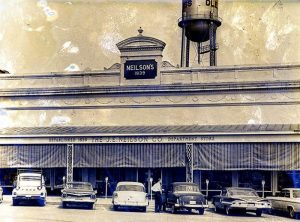 Students in Professor Alexandra Lindgren-Gibson‘s winter intersession course on “Public History from Colonial Williamsburg to Drunk History,” spent the past two weeks investigating and documenting the history of an Oxford landmark, Neilson’s Department Store.
Students in Professor Alexandra Lindgren-Gibson‘s winter intersession course on “Public History from Colonial Williamsburg to Drunk History,” spent the past two weeks investigating and documenting the history of an Oxford landmark, Neilson’s Department Store.
Using the records related to Neilson’s Department Store at the Archives & Special Collections at the UM Library, they created an online exhibit that presents their findings.
JANUARY 8, 2019 BY

Jessica Wilkerson
Three faculty members at the University of Mississippi’s Center for the Study of Southern Culture are kicking off the spring semester with a celebration of their books’ publication.
The event, set for 5 p.m. Jan. 22 at Off Square Books in Oxford, features Jessica Wilkerson, who wrote “To Live Here You Have to Fight: How Women Led Appalachian Movements for Social Justice”; Kathryn McKee, author of “Reading Reconstruction: Sherwood Bonner and the Literature of the Post-Civil War South”; and Ted Ownby, with his book “Hurtin’ Words: Debating Family Problems in the 20th Century South.”
Based on Wilkerson’s dissertation, “To Live Here You Have to Fight” (University of Illinois Press, 2018) blends women’s history and Appalachian history with labor, class and activism to examine the War on Poverty launched in 1964. The assistant professor of history and Southern studies visited archives around the region and interviewed people who had been activists in the 1960s and ’70s.
“Ultimately I was drawn to the stories of women in eastern Kentucky, where there’s a long history of women’s activism in the coalfields, from the 1920s to the present,” she said. “The book starts with their experiences and then follows them into other networks – regional and national – as they got involved in political and social movements.”
There are no simple explanations for complex histories, and it was important for Wilkerson to contextualize the women’s lives historically and to understand the movements in which they participated. Appalachian women acted as leaders and soldiers in a grassroots war on poverty – shaping and sustaining programs, engaging in ideological debates, offering fresh visions of democratic participation and facing personal political struggles.
“In a broader sense, the big takeaway is that starting from the perspective of women, especially poor and working-class women, allows us to see all sorts of things – federal policy, social movements, labor, the history of Appalachia – from a fresh and, I believe, necessary perspective,” she said.
The activists she writes about may have been overlooked, but their persistence brought them into unlikely coalitions with black women, disabled miners and others to fight for causes that ranged from poor people’s rights to community health to unionization.
“My point about caregiving is that women’s activism often reflected their predominant role in society; i.e., that due to gender, policy and social customs, women then – and now – took on the burden of caring for children, the elderly and people with disabilities,” Wilkerson said.

Ted Ownby
Ownby, the center’s director and William F. Winter Professor of History, hopes to call attention to the three interdisciplinary texts all published on different university presses, as well as to the three colleagues who teach together.
“Having this event the first day classes start is a way to bring people together and celebrate books, scholarship and working together,” he said. “Many people in their introductions say writing is solitary, but celebrating three books together suggests that finishing a book is not.”
In “Hurtin’ Words” (University of North Carolina Press, 2018), Ownby considers how a wide range of writers, thinkers, activists and others defined family problems in the 20th century American South. The idea for the book originated when Ownby wrote a paper about Southern rock music and all the men who didn’t think it was possible to stay in a lifetime relationship.
“It’s about the problem of family life, the relationship between what people expect and hope for, and why does it matter what people think about you,” he said. “Those Southern rockers thought it was really important that no one understood them and felt it was important to address other peoples’ misunderstandings.
“Teaching and writing about Southern studies means I find myself writing on a lot of topics, wondering what they had to do with each other, and several had to do with family life and family problems.”
The title comes from Tammy Wynette’s song “D-I-V-O-R-C-E,” which she said “spelled out the hurtin’ words” to spare her child the pain of family breakup.
“Authors never know what readers will like or dislike, but what I hope is that people are intrigued by these definitions of family life instead of just thinking about specific issues, and they are thinking about family ideals and problems,” Ownby said.

Kathryn McKee
McKee looks further into the past to gain insight into Sherwood Bonner (1849-1883), a Holly Springs native who portrayed the discord and uneasiness of the Reconstruction era in her fiction and nonfiction.
The McMullan Associate Professor of Southern Studies and associate professor of English reassesses Bonner’s place in American literary history by taking her seriously as an author. McKee said she has long been haunted by Bonner’s life and choices, her blind spots, her shortcomings and her successes.
“She was a young woman who made controversial choices, even today, but the most important thing about her was her drive to be a writer,” McKee said. “She knew she had to leave Mississippi in order to make writing the most important thing in her life.
“Today, society still struggles with ambitious women, but she couldn’t live with herself without trying to be a writer.”
The book (LSU Press, 2019) participates in a renewed attention to the period of Reconstruction in American literary history, and an interest in recovery of 19th century writers.
“We’ve moved beyond a celebratory existence to a stage of seeing knotty imperfection of their efforts,” McKee said.
The event at Off Square Books is especially important to McKee because it reflects the collaboration and collegiality of the center, especially as the faculty members were all moving in the same phases to complete their work.
“It also reflects the values of this place – a common spirit that we all work to understand better the common subject that we share,” McKee said. “We all have the same sets of questions about the region, this place, identity and power. It is rewarding to work at center because of a common pursuit of shared interests.”
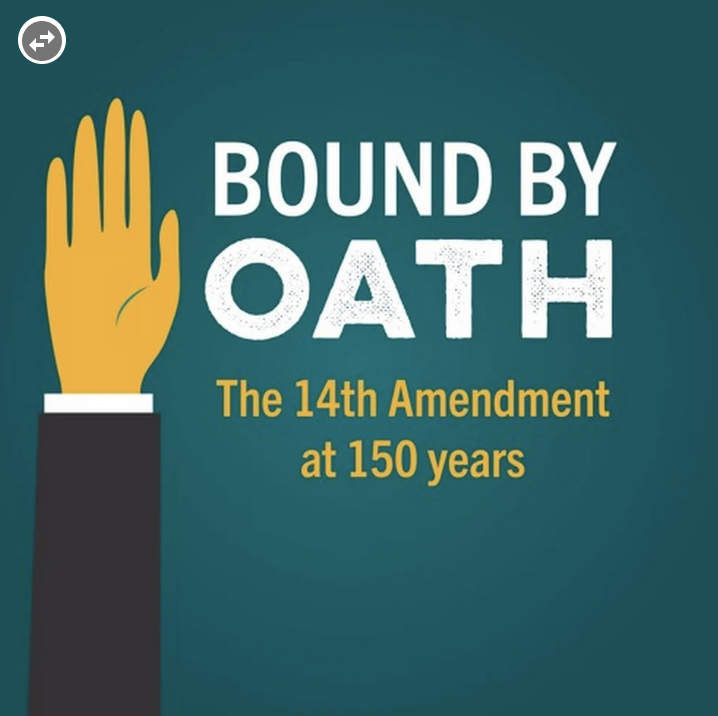 Anne Twitty, associate professor of history, discusses her research into the freedom suits filed by Dred Scott and his family in a new podcast released by the Institute for Justice.
Anne Twitty, associate professor of history, discusses her research into the freedom suits filed by Dred Scott and his family in a new podcast released by the Institute for Justice.
Titled “Before the 14th: John Rock and the Birth of Birthright Citizenship,” this episode kicks off a new series that investigates the history of the 14th Amendment, which lies at the center of just about any modern constitutional controversy, by telling the story of a little known figure named John Rock, the first African-American admitted to argue cases before the United States Supreme Court, who was sworn in before some of the very same justices who had ruled just a few years earlier in Dred Scott that black people could never be citizens.
For more information about Twitty’s research, check out her first book, Before Dred Scott: Slavery and Legal Culture in the American Confluence, 1787-1857, which was published by Cambridge University Press in 2016.
In addition to Professor Twitty’s work in this particular episode, doctoral candidate Nicholas Mosvick also serves as the historian consultant and editor on Bound by Oath podcast series..
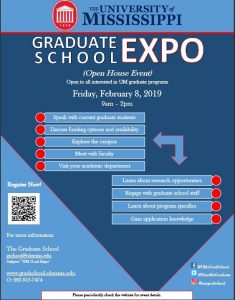 Mark Your Calendar for the Graduate School Expo
Mark Your Calendar for the Graduate School ExpoThe Graduate School’s annual Open House is scheduled for Friday, February 8, 2019. This is a FREE event but registration is required. All individuals interested in our graduate degree programs are welcome to attend.
Visit the website for more information!
Join Arch Dalrymple III Department of history faculty Ted Ownby and Jessie Wilkerson for a celebration of their new books at Square Books on Tuesday, January 22, 2019. The book signing starts at 5PM and a presentation follows at 5:30PM.
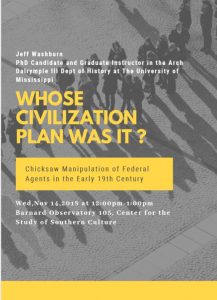 Ph.D. Candidate Jeff Washburn examines “Whose Civilization Plan Was It? Chickasaw Manipulation of Federal Agents in the Early Nineteenth Century” in a brown bag lunch talk at noon in 105 Barnard Observatory on Wednesday, November 14th. This event is part of the celebrations around Native American Heritage Month.
Ph.D. Candidate Jeff Washburn examines “Whose Civilization Plan Was It? Chickasaw Manipulation of Federal Agents in the Early Nineteenth Century” in a brown bag lunch talk at noon in 105 Barnard Observatory on Wednesday, November 14th. This event is part of the celebrations around Native American Heritage Month.